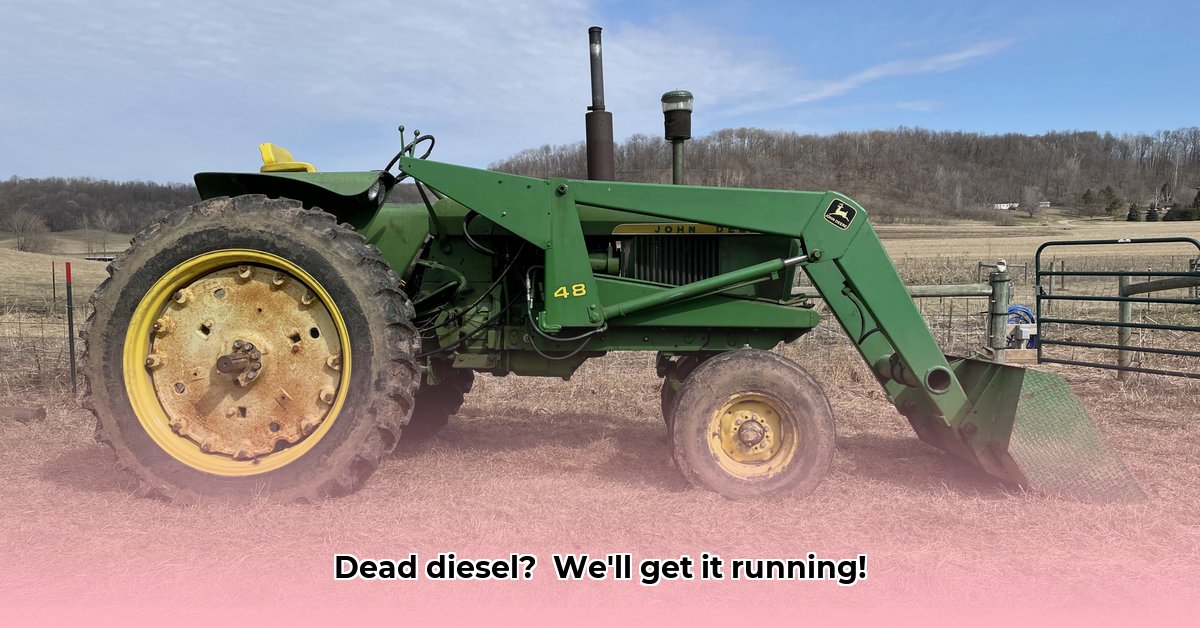
Diesel Tractor Cranking But Won't Start: A Troubleshooting Guide
It's incredibly frustrating when your diesel tractor cranks but refuses to fire up. This guide will walk you through troubleshooting steps, helping you identify and fix the problem, or determine when professional help is needed. We'll start with simple checks and progress to more in-depth diagnostics. Even if you're not a mechanic, you can likely resolve many common causes. For more specific labor cost information, check out this helpful resource on tractor repair costs.
Safety First: Protecting Yourself and Your Equipment
- Disconnect the Battery: Always disconnect the negative (-) battery terminal before starting any work. This prevents accidental shorts and electrical shocks.
- Well-Ventilated Area: Diesel fumes are harmful. Work outdoors or in a well-ventilated area.
- Protective Gear: Wear safety glasses, gloves, and sturdy work boots.
Initial Checks: Quick Wins
These easy checks often reveal the solution quickly.
Battery Voltage: A weak battery can mask other issues. Use a multimeter to check the voltage. A fully charged battery should read around 12.6 volts. Below 12.2 volts indicates a weak battery needing charging or replacement. Clean corroded terminals with a wire brush. (A multimeter measures electrical voltage and can be borrowed from an auto parts store.)
Fuel Level: Check your fuel gauge. An empty tank is a surprisingly common cause of no-starts.
Fuel Leaks: Visually inspect fuel lines for any leaks. Even a small leak can prevent the engine from receiving enough fuel.
Starter Motor Operation: Listen carefully to the starter motor. A strong cranking sound is good. A slow, weak crank suggests a weak battery or failing starter. A rapid clicking indicates a possible faulty solenoid or extremely weak battery. A grinding sound suggests a problem that requires professional attention.
Systematic Troubleshooting: Addressing Potential Problems
If the initial checks are normal, let's delve deeper.
Fuel System Inspection: This is a frequent source of no-start problems.
- Fuel Filters: Dirty fuel filters restrict fuel flow. Inspect and replace them if necessary. (Replacement filters are available at most farm supply stores.)
- Air in Fuel Lines (Bleeding): Air in the fuel lines prevents proper fuel delivery. Your tractor's manual will detail the bleeding procedure, which usually involves opening bleed valves until fuel flows freely. (Be prepared for some mess; have rags handy.)
- Fuel Lines: Check for cracks, kinks, or damage.
- Fuel Pump/Injectors: Problems here are more complex and usually require a professional mechanic. Listen for unusual noises from the pump – a humming or groaning might signal trouble.
Air Intake System Check: The engine needs air as well as fuel.
- Air Filter: Inspect the air filter for blockages. Replace if dirty or clogged.
Glow Plugs (Cold Weather Starting): Glow plugs preheat the combustion chamber, aiding cold-weather starts. Testing glow plugs usually requires a multimeter to check their resistance. (Consult your owner's manual, or call a mechanic if you're uncertain.)
Compression Test: A compression test measures cylinder pressure. Low compression indicates internal engine problems needing professional attention. This requires a compression tester, which can often be rented.
When Professional Help is Essential
Some issues require specialized tools and expertise. If the problem persists after trying these steps, or if you encounter anything beyond your comfort level, don't hesitate to call a qualified diesel mechanic. Fuel injector problems, fuel pump failures, and complex electrical issues are best left to the professionals.
Preventative Maintenance: Prolonging Your Tractor's Life
Regular maintenance is your best defense against future no-start issues.
- Fuel Filter Replacement: Replace according to your owner's manual's recommendations (often every 250-500 hours).
- Battery Maintenance: Inspect and clean battery terminals regularly. Consider testing the battery's charge periodically.
- Air Filter Replacement: Replace as needed based on your manual's recommendations.
- Engine Oil Changes: Follow the oil change schedule in your owner's manual.
- Fuel Line and Wiring Inspections: Inspect annually for damage, leaks, or corrosion.
By following these steps and performing regular maintenance, you can greatly increase the chances of keeping your diesel tractor running smoothly. Get back to work!